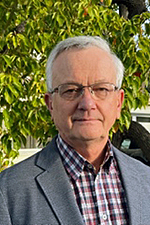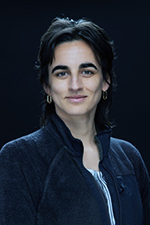Particle Accelerator Science and Technology Awards

The IEEE Nuclear and Plasma Sciences Society Particle Accelerator Science and Technology (PAST) Technical Committee grants the PAST Award to individuals who have made outstanding contributions to the development of particle accelerator science and technology.
Two Awards are granted at each of the Particle Accelerator Conferences held in North America (PAC or IPAC). The 2024 PAST Awards and the PAST Doctoral Student Award were presented at the 2024 International Particle Accelerator Conference (IPAC’24), which was held in Nashville, Tennessee, May 19th–24th, 2024.
Gennady Stupakov, PAST Award Recipient

Dr. Gennady Stupakov of SLAC and xLight is the winner of the IEEE NPSS Particle Accelerator Science and Technology Award 2024.
Dr. Gennady Stupakov graduated from Novosibirsk State University in 1975 with specialization in plasma physics. He then worked at the Budker Institute of Nuclear Physics in Novosibirsk where he earned his Candidate of Sciences and Doctor of Sciences degrees. In 1991 he moved to the US to join the Superconducting Super Collider laboratory in Waxahachie, TX, and after the shutdown of the SSC in 1993 he joined SLAC in 1994. In 2024 he retired from SLAC and now works at a start-up company xLight Inc. in Palo Alto, CA, USA.
His scientific interests cover a broad range of topics in accelerator physics, including free-electron lasers (FELs), coherent and incoherent radiation generated by electron beams, and various aspects of electron beam dynamics involving particle acceleration, interaction of electron beams with lasers, and interaction of beams with environment. In these contexts, Dr. Stupakov has given many important and pioneering contributions to the field of accelerator science and X-ray FELs, strongly contributing to their success as unique X-ray sources for the exploration of matter at the atomic and molecular level. One of the most important contributions is the idea of the echo-enabled harmonic generation (EEHG) for seeding an FEL with an external laser at a wavelength much larger than the final FEL wavelength, to improve its longitudinal coherence properties and reduce the spectral linewidth. The EEHG has been shown viable and implemented at various laboratories in the world and has been considered as a primary FEL architecture for several soft X-ray FELs.
He regularly teaches various accelerator physics courses at the US Particle Accelerator Schools. He is a Fellow of the American Physical Society and in 2019 he received the International FEL prize, and in 2022 the USPAS Prize for Achievement in Accelerator Science and Technology. He is the co-author of the book Classical Mechanics and Electromagnetism in Accelerator Physics, (2018).
He is presently the Chief Scientist at xLight Inc., a start-up focused on industrializing superconducting RF and free-electron laser technology for use in the semiconductor community and beyond. “Gennady was a North Star for the bourgeoning race to industrialize accelerator technology, building off of 50+ years of Department of Energy/taxpayer investment, and now he is at the center of that race for our domestic capabilities,” Erik Hosler, CTO, xLight Inc., said about him.
Citation: Broad contributions in accelerators, including innovative advances in the areas of collective effects and free-electron lasers, enabling robust operation and extended performance.”
Agostino Marinelli, PAST Award Recipient

Prof. Agostino Marinelli of SLAC is a winner of the IEEE NPSS Particle Accelerator Science and Technology Award for 2024.
Prof. Agostino (Ago) Marinelli received his PhD in physics from UCLA in 2012 and moved to SLAC shortly after as a postdoctoral research associate. He received a Panofsky fellowship in 2015 and joined the SLAC faculty in 2019.
Starting just after completing his PhD work, Prof. Agostino Marinelli has developed with great success his project to generate ultrafast, attosecond duration X-ray pulses using an X-ray FEL, LCLS at SLAC. Using this method he has been able to generate ultrashort X-ray pulses with intensities many orders of magnitudes larger than that obtainable with different approaches. Compared to other programs to investigate attosecond science, the system that was developed using the novel capabilities of XFELs, can generate a much larger photon flux, giving unique scientific opportunities. His leadership position in the international science community, in the ultrafast science area, is well recognized, as shown by the recent invitation to give a talk on “Attosecond X-ray free-electron lasers” at the Nobel Symposium on Attosecond Science held in Lund, Sweden, in August 2023. He is a recipient of the American Physical Society’s outstanding doctoral thesis research prize in beam physics, the young Investigator FEL prize and the European Physical Society’s Frank Sacherer prize. He was elected Fellow of the American Physical Society in 2023.
Ago Marinelli is an assistant professor of Photon Science and Particle Physics and Astrophysics at the SLAC National Accelerator Laboratory, and a Principal Investigator at the PULSE Institute. He is also currently the head of the free-electron laser physics department, as well as the co-lead of the free-electron laser R&D program at SLAC. As the leader of this very important group for the future of LCLS and SLAC, he is pushing a research program aimed at maximizing the scientific output of present and future X-ray FELs at SLAC. The program is a very good mixture of FEL and accelerator physics research, including cavity-based free-electron lasers, development of advanced pump-probe capabilities, attosecond science and beam shaping techniques for maximizing the X-ray brightness. The development of attosecond X-ray pulses with the LCLS, as well as their application to ultrafast pump-probe experiments, is his main personal research interest, and is an area where he has achieved brilliant results with world-wide recognition. The extension of these techniques to the new superconducting versions of LCLS, that he is pursuing, will certainly be very fruitful in the future.
Citation: For his critical contributions to the development and operation of attosecond X-ray free-electron lasers.
Kellen McGee, Particle Accelerator Science And Technology Doctoral Student Award Recipient

Dr. Kellen McGee of FNAL is the recipient of the 2024 IEEE Particle Accelerator Science and Technology Doctoral Student Award.
Dr. Kellen McGee received her Ph.D. in Physics from Michigan State University in 2023. Her thesis, “Advancements in high-Q development for novel medium-velocity 644 MHz 5-cell elliptical superconducting RF (SRF) cavities for continuous-wave operation in heavy-ion linacs,” developed leading-edge high-efficiency RF surface treatments for the novel niobium cavities proposed for the 400 MeV/u Uranium upgrade to the Facility for Rare Isotope Beams’ driver linac. These techniques produced high-performance of medium-β sub-GHz elliptical cavities with reduced heat loads, reduced RF power needs, and increased reliability, and are readily applicable to mass production. Through her studies, she achieved an unprecedented Q0 value in this class of cavities, nearly twice the requirement for the cavity in operation.
After receiving undergraduate degrees in Physics and English from Johns Hopkins University in 2013, she worked as an Aegis ballistic missile defense radar analyst at the Johns Hopkins Applied Physics Laboratory in Laurel, MD until 2015. She then moved back into the academic setting, studying protein-protein interactions as a research assistant in a biophysics and structural biology lab in the Case Western Reserve School of Medicine, until beginning her graduate career at Michigan State University in 2018, where she was awarded the National Superconducting Cyclotron Laboratory (NSCL) research fellowship for the duration of her studies. In 2020, she received a full-year DOE Office of Science Graduate Student Research Grant (SCGSR) supporting joint research on 650 MHz niobium SRF cavities at host institution Fermi National Accelerator Laboratory, and subsequently was admitted to the FNAL Joint PhD program in Accelerator Physics for the rest of her degree. Upon graduation, Dr. McGee joined FNAL full-time as an Engineering Physicist-II, leading research and development efforts in multiple SRF frontier topics, including developing travelling-wave cavities, as well as high-Q development in 800 MHz cavities for FCC-ee.
When not at work, she is likely to be found either driving or running the foredeck of various competitive offshore racing sailboats, having logged thousands of nautical miles in the Great Lakes, Atlantic, and Pacific Oceans, winning several prestigious races over the years.
Citation: For outstanding experimental work in validation and performance advancements for novel medium-velocity sub-GHz superconducting resonators for continuous-wave operation in hadron linacs.
Paolo Craievich, Ph.D., PAST Awards Chair, can be reached by E-mail at [email protected].